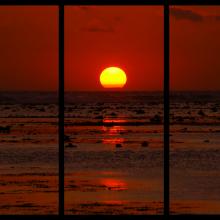encyclical
Hundreds of Catholic institutions around the globe have announced plans to divest their finances of oil, gas, and coal to help fight climate change since Pope Francis published his landmark encyclical on environmental stewardship in 2015 urging a break with fossil fuels.
Does Pope Francis have a position on the Dakota Access Pipeline?
That’s one question he hasn’t been asked, and he might demur if pressed on such a specific issue. But in his landmark encyclical on the environment published last year, and in other statements, Francis has strongly supported arguments of the Native American-led resistance movement on three core issues: indigenous rights, water rights and protection of creation.

Jenny Zhang / Shutterstock
THE POPE'S “climate change encyclical,” Laudato Si’ (“Praise Be to You”), is actually far more than that: It is the most remarkable religious document in a generation, offering a powerful and comprehensive worldview that is consonant with the Bible and hence profoundly countercultural. You owe it to yourself to take a few hours and read it slowly and carefully; you’ll be enlightened, but mostly, if you’re like me, you’ll be reassured. Reassured that someone powerful in this world actually sees our time for what it is, and understands the crises facing our planet for what they are.
Near the beginning, for instance, the pope discusses the “rapidification” of life, the sense that “the speed with which human activity has developed contrasts with the naturally slow pace of biological evolution. Moreover, the goals of this rapid and constant change are not necessarily geared to the common good or to integral and sustainable human development. Change is something desirable, yet it becomes a source of anxiety when it causes harm to the world and to the quality of life of much of humanity.”
That’s as useful a description of the last 100 years as we’re likely to get, that sense of life out of balance. It affects the poor, yes, and the pope is always most mindful of the poor—but it also affects everyone. The ever-more-technologized world we inhabit no longer makes us happier. It makes us stressed.

Cardinal Peter Turkson poses as he holds Pope Francis’ new encyclical titled “Laudato Si’ (Be Praised): On Care of Our Common Home” during the presentation news conference at the Vatican on June 18, 2015. Photo via REUTERS / Max Rossi / RNS
The Vatican is calling on bishops globally to act on the pope’s groundbreaking environmental encyclical, Cardinal Peter Turkson said in an interview.
Last week, bishops’ conferences across the world were sent a message urging them to speak up about the message of the papal letter, which called for greater action on the environment, said Turkson, who is president of the Vatican’s Pontifical Council for Justice and Peace.
AS POPE FRANCIS prepares to release his encyclical on climate change, it’s worth remembering exactly how far the conversation on religion and the environment has come in the past quarter-century.
When I wrote The End of Nature back in the late 1980s, there was very little religious environmentalism. Liberal churches believed that ecology was a subject to be addressed once you’d finished with war and poverty; conservative churches viewed it as a way station on the road to paganism. And Christians in general still reeled under the idea, propounded by Lynn White in an influential essay in Science magazine, that the Genesis call for dominion had led directly to the destruction we saw around us.
In those early days, there were a few wayfarers on this path. Thomas Berry, for instance, and even more important a pair of academics—Mary Evelyn Tucker and John Grim—who picked up his clues and sweated blood to assemble theologians from around the world and search every tradition for the roots of ecological thinking. Episcopal Power and Light—now Interfaith Power and Light—was an early and successful effort at congregational action; Shomrei Adamah (Guardians of the Earth) was an early effort in the Jewish community that has blossomed into many flowers.
Rabbi Moti Rieber travels the politically red state of Kansas armed with the book of Genesis, a psalm and even the words of Jesus to lecture church audiences, or sermonize if they’ll let him, about the threat of global warming.
“My feeling is that I’m the only person these people are ever going to see who’s going to look them in the eye and say, ‘There’s such a thing as climate change,’” Rieber said. “I’m trying to let them know it’s not irreligious to believe in climate change.”
He is at the vanguard of religious efforts — halting in some places, gathering speed elsewhere — to move the ecological discussion from its hot-button political and scientific moorings to one based on theological morality and the right thing to do.
The Catholic church is reeling from the several sexual abuse allegations that have come to light over the past three months. Downplaying the severity of this scandal will only further damage the already beleaguered church's image and credibility. Many in the media blame Pope Benedict XVI for the mismanagement of the sexual abuse crisis.
While it's generally not worth spilling any ink over Glenn Beck, his recent attacks on churches that preach "social justice" has rightly earned the condemnation of diverse faith leaders



